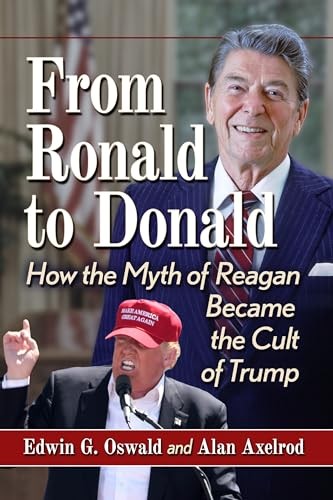Thank you McFarland for providing this book for review consideration. All opinions are my own.
Mr. Book just finished From Ronald To Donald: How The Myth Of Reagan Became The Cult Of Trump, by Edwin G. Oswald and Alan Axelrod.
This book does an excellent job reviewing the life and record of Ronald Reagan, to show that the realities of Reagan were far different than the mythology that his worshippers have created. It shows how accepting the myths of the Reagan years helped set the stage for the presidency of Donald Trump (or, as I argue, he should be known as the “felon in chief”).
Throughout his presidency, Reagan used to claim he did things he hadn’t done, sometimes instead substituting a movie role for real life. Reagan appears to have been such a believer in the stories that he told that he didn’t even have the ability to distinguish between the facts and myths of his own life. For example, Speaker of the House Tip O’Neill invited President-elect Reagan to his office and O’Neill showed him his desk, which used to be used by President Grover Cleveland. Reagan then said he once played Cleveland in the movies, at which point O’Neill had to explain to him that he played Baseball Hall of Famer Grover Cleveland Alexander, not President Cleveland, in a movie.
The author made a good point that the mythology of Reagan started with his inaugural address. He actually said, “In this present crisis, government is not the solution to our problem; government is the problem.” So, Reagan’s quote was limited to just to the economic condition that the nation faced when he took office, not as an underlying governing philosophy. The authors then the message of Reagan then becomes “Government is not the solution to our problem; government is the problem. It is no longer of an issue of the present crisis. Government is bad. Period. This is the Gospel, the New Testament, and politically speaking, its recollection, minus the first four words, cast Ronald Reagan in his greatest role ever: Messiah.” Additionally, cutting the first words to the quote “was destined to figure as a reduction absurdum packing the annihilating punch of a thermonuclear weapon.” Reagan continued to use that line, minus the first words, throughout his presidency. So, while it was still the governing philosophy of his administration, its origin story is still a myth.
But, while the exact wording of the inaugural address, compared to the rest of his presidency may be a trivial matter, there was nothing trivial about the effects of declaring government was the problem. The book’s thesis can be summed by looking at what that myth has gave us: “Among other things, we got the dismantling of government, especially of the so-called administrative state, which consists of the cadre of professionals and experts with the kind of specialized knowledge to combat—of, we don’t know, but say a global pandemic the likes of which has not visited planet Earth since 1918-1919. We got a level of economic disparity that nullifies the American Dream for many of our fellow citizens, destroys national unity and threatens to torment a revolution …What we got from the Reagan Legacy, four decades after it was created, is the America of Donald Trump, who has sold the soul of American democracy and stuck us all with the bill that is at least in part calculable in an increase of national debt of approximately $8 trillion over his four-year presidency term.”
The book gives a lot of biographical discussion on Reagan, while showing aspects of his life that have become mythologized. From example, the authors disprove the myth that it was Nancy’s family who turned Reagan from a “hemophiliac liberal” to an anti-government conservative. Instead, it was Reagan’s own greed by him not liking his personal tax rates while he was an actor. Another good example is how Iran-Contra wasn’t the first time that Reagan showed “a talent of selective memory, although a more accurate description would be a talent for selective failure of memory.” He was very good at claiming not to remember things while testifying before a grand jury investigating a scandal involving the Screen Actors Guild while he was union president.
Reagan’s tenure as governor also set up this for his presidency. It created the myth of him being a tax cutter, while in reality, he raised taxes. And, on the few occasions in which he cut taxes, it was only to give the overwhelming majority of the benefit to the rich.
The chapter on Reagan and racism was very good. Then, the next chapter, on Reagan’s tax policies as president, and to a lesser extent Trump too, was the best of the book. The discussion of “supply side economics”, which really needs to be better known as “voodoo economics” was also also excellent. And whenever the public is reminded that Reaganomics was nothing more than voodoo economics, they need to be reminded that even his own Vice President, George H.W. Bush, was the one who originated the phrase.
I give this book an A+ and inducted it into my Hall of Fame. Goodreads requires grades on a 1-5 star system. In my personal conversion system, an A+ equates to 5 stars. (A or A+: 5 stars, B+: 4 stars, B: 3 stars, C: 2 stars, D or F: 1 star).
This review has been posted at my blog, Mr. Book’s Book Reviews, and Goodreads.
Mr. Book originally finished reading this on June 15, 2024.


